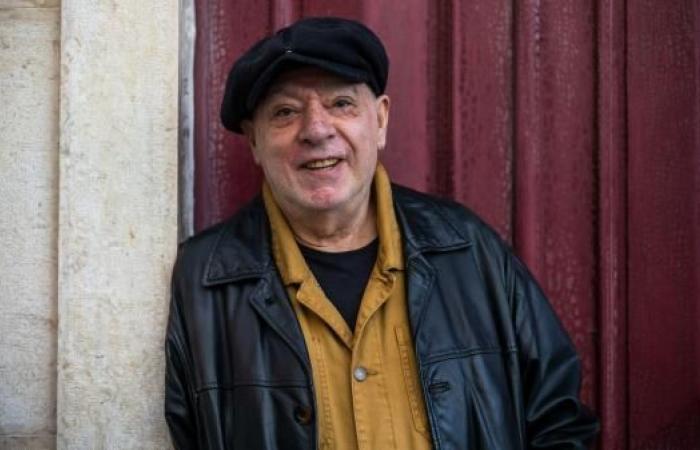The drums roll and you hear: «I wanted to know who I am». It is the opening verse of «E Além do Adeus», the unmistakable «song» performed by Paulo de Carvalho at Eurovision, in March 1974, and which served as the password on the night of April 24th.
On the day that marks half a century since the Carnation Revolution, the More football unveils the conversation with the artist, who, before becoming one, made people talk about indoor football and Benfica’s formation.
From the games in the 1950s in Alvalade, to the carnations and the millions who “don’t score goals”. Paulo de Carvalho, 77 years old, rewinds time as if revealing a tidy and fresh room.
«It all started on the street, in the Alvalade area, where I lived from the age of three. There were farms and lots of space to play. We talked about ’54 or ’55, and I was lucky enough to have some footballs, given to me by my father, who worked on boats», he begins by saying.
Previously, Paulo de Carvalho had made his debut on the Jamor benches, paying tribute to Virgílio, from FC Porto, and Matateu, from Belenenses.
«I saw the debut of three players who came from Mozambique: Costa Pereira, Coluna and Naldo. The tribute to Virgílio was during a Benfica-FC Porto match. On the same day, also at the National Stadium, I attended the tribute to Matateu, during a Belenenses-Sporting match. It was at the beginning of the ’54 season,” he describes.
The experience on the street, between dirt and gravel, earned Paulo de Carvalho numerous compliments, which motivated the then 11-year-old teenager to join the Neptunos da Estefânia, an indoor football team – not to be confused with futsal – that had some promises from Sporting’s formation.
«It was there that I met Vítor Damas, a friendship that lasted», he highlights. The goalkeeper was the motto for Paulo de Carvalho to accumulate adventures with a lion on his chest, sometimes on Rua do Passadiço, next to Avenida da Liberdade, sometimes on land above the José de Alvalade Stadium.
Vítor Damas, unmistakable name in goal for Sporting and the national team
Still, the artist dreamed of the colors of “eternal rivals”, a goal he achieved at the age of 13, before crossing paths with “Nini”.
«I am a lifetime member of Benfica. At that time it was my club. Then the indoor football games became, let’s say, funny, because I was the Benfica kid who played with the Sporting guys. We trained at the old Estância de Madeira, Benfica’s second field, after Campo das Amoreiras », he remembers.
At the time, clubs trained athletes from the age of 14 onwards. However, Paulo de Carvalho’s height of 79 centimeters convinced the Eagles’ directors to make this exception possible.
«The first attempts to apply the 4-3-3 appeared. That’s why he played as a central midfielder, tending to the right side”, he notes.
Until he was 17, Paulo de Carvalho only worried about having a ball at his foot. From these adventures he remembers the camaraderie of Arcanjo and Carreiro, a duo who participated in the Cup Winners’ Cup and UEFA Cup campaigns, in the ’60s, for the “brilliant” Vitória de Setúbal. At the helm was Fernando Vaz.
Follow, here, the special chronology prepared by Maisfutebol for the 50th anniversary of the Carnation Revolution.
The signs of April and a choice
Later, Paulo de Carvalho took on an artistic streak, in step with the awareness of Salazar’s Portugal.
«I started working at an insurance company and studying at night. When the dream of music came up, I had to choose. I started playing football as an amateur. From the age of 20 I started to worry about political and cultural reality », he explains.
Even so, the artist could have continued his career, for example, at Companhia União Fabril (CUF), where there was «facilitated employment», or at Académica de Coimbra, through studies. However, the dream of music was already bigger. In Belém, in Restelo, Paulo de Carvalho lived his last days as a federated athlete.
In the aforementioned broad perception of the country’s reality, Paulo de Carvalho was attentive to football, from the players to members of the Portuguese Legion and the Political Police (PIDE).
«There were the directors. In some clubs, they controlled the structure and blackmailed the players. There were even people who entered the locker room and fired shots at the ceiling, so that the players would assume a different stance on the field,” he reports.
Between conversations with friends, such as Artur Jorge, Paulo de Carvalho uncovered the true “world of football”, revealing the growing concern regarding sports organization. They were signs of April, of the longed-for dawn.
The accidents that changed history
In the early hours of April 25, Paulo de Carvalho returned home, then near Avenida de Roma, at 2 am, riding with a friend.
An hour and a half before they hit the road, «Grândola Vila Morena», by Zeca Afonso, had sounded on Rádio Renascença, which, in turn, was momentarily silenced, minutes after midnight.
Without a radio, the singer was unable to keep up with current affairs during the trip. Nor of its own importance in the ongoing revolution, since «E Além do Adeus» had played at 10:55 pm on April 24th at Emissores Associados in Lisbon.
“I got up very early [risos]. From the 24th to the 25th I was in a cafe. The next day, they knocked on my door and said there was a coup d’état. I asked: “For better or worse?” Nobody knew, so I said, in a silly way: “Then let me sleep” [risos]. It was one in the afternoon, I also went out into the street. It was a surprise», he explains.
At that time, the street was abuzz. If, on the one hand, Salgueiro Maia’s forces had surrounded the GNR Barracks in Largo do Carmo, where Marcello Caetano was located, the truth is that, at the PIDE headquarters, the officers shot at the people.
However, the commanders of the Portuguese Legion and the General Staff surrendered, something that Marcelo Caetano would also do later.
What about voice as a military password? Another surprise, guarantees Paulo de Carvalho, something he discovered years later. Now, says the artist, the theme «And After Goodbye», written by José Miza, was the alternative to stop the will of Otelo Saraiva de Carvalho, who intended to release «Venham Mais Cinco», by Zeca Afonso.
«My only collaboration was to perform a love song. João Paulo Diniz had the idea of choosing a first password that would not raise suspicions », he recalls.
In the ridiculous accidents of life, Paulo de Carvalho saw the voice immortalized by one of the most important chapters of Portuguese democracy.
The end of the Estado Novo was consummated at 10 pm, on a night also stained with blood, due to the five fatalities.
The world of football after April
Able to spread magic on the pitch, but as an “amateur”, Paulo de Carvalho continued to be involved in football for several years. So much so that he was baptized as «The Argentine» by Toni, a regular spectator of the «peladinhas». This nickname symbolized the “ability to read games”. The artist was, also on the field, a «Flower Without Time».
Years earlier, with Milorad Pavic’s Benfica team, in the 74/75 season, Paulo de Carvalho finally got to know the nucleus of national football.
«I asked to train with that sensational team – they included Bento, Zé Henrique, Vítor Batista, Nené, António Simões, Jordão, Eusébio, Artur Jorge and Humberto Coelho – and I was able to see football from the inside, at a time when we were all trying to organize ourselves , in freedom», he recalls.
For the singer, the Carnation Revolution only allowed national football to open up to thousands and millions, and to the new generation of “directors”.
“I don’t know if millions score goals. People’s interests have changed. Players are players, directors are directors. But, it all depends on the money. I’m not nostalgic, I’m for freedom, with responsibility, something that has been lost”, he concludes.
«In the stands and on the field There is a lot of game to be played, This fight is also a class fight. It is blinder what you don’t want to see.
The problem is always the strength of sport against capital, directors who enter the game to achieve social promotion»«Kick now, go!», by Paulo de Carvalho
Well, let the “Bullfight” also play, a theme performed by Fernando Tordo at Eurovision in 1973.
«And a lot of dollars come in, a lot of people, That makes a profit in the millions»
In those months with the Benfica squad, Paulo de Carvalho strengthened his ties with Artur Jorge, for the artist an example that should serve as a motto to pierce this «bubble».
«There is a lack of people like Artur Jorge. In Portugal, I won’t say there is fear, but it is still difficult to talk about any topic with complete ease. We need more people like him, basically to achieve the cultural revolution», he says.
Tordo, Tozé Brito and Carlos do Carmo in Luz
A lifelong member of Benfica, the artist cherishes one of the first times he visited the «Inferno da Luz», at the hands of his father, in the summer of ’62, in a match with Santos and won by Pelé and company (2-5) . He remembers those times as fans who “moved around the club”, without allowing anarchy to prevail.
«The old Estádio da Luz was more vibrant, but less comfortable and more dangerous. It was enough to get there and they managed to fit 120 thousand people where 70 thousand could fit comfortably. I can say that I saw Pelé and Eusébio play. Later, I saw, for example, Cruyff, Cristiano Ronaldo and Messi. It’s a luxury of old age,” he says, with pride.
And what about voices from April at Estádio da Luz?
«Fernando Tordo’s father had a box, because he was part of the motorsport section, at a time when the clubs were truly eclectic. I also met Tozé Brito many times. Carlos do Carmo – who was from Belenenses – came once, at our invitation, when he celebrated his 60th birthday. We almost forced him to watch Benfica-Belenenses, and we offered him a shirt with the number 60… to make up for the 4-0 he got », he recalls, amidst laughter, which doesn’t hide his nostalgia.
Praise for João Neves and António Silva
Back to the present, and questioned by More football Regarding Benfica’s moment, Paulo de Carvalho points to the home team’s silverware.
«João Neves and António Silva have school and understand Benfica in a completely different way. Again, I’m not a nostalgic person, but, in the past, there was another way of understanding and respecting Benfica. João Neves, especially, fills me up, because he doesn’t sit still and it seems like he has two air pumps. The rest, sometimes, just seems like a bunch of players,” he analyzes.
Gradually becoming a regular “couch spectator”, Paulo de Carvalho admits to avoiding returning to stadiums, given the attitudes he witnessed.
«I’m going to tell an old story. It’s the story of kicking the ball, It starts at the secretary And ends with a lot of noise.
The nine comes and a penalty misses. Good excuse in the jungle game, For the guys to stand up on the bench And throw themselves furiously onto the grass.”
«Kick now, go!», by Paulo de Carvalho
Finally, the artist reveals that at home little or nothing is said about football: «Mafalda Sacchetti was the only one who went to football with me. I think Agir is from Sporting just to annoy me [risos]».
In any case, the primordial essence – music – didn’t even need to be transmitted, as it runs in the soul of that family. Of the four children, only one did not follow the artistic path.
From Eurovision to the doors of freedom, «And After Goodbye» was the door that Paulo de Carvalho – without even knowing it – helped open, towards democracy. Half a century ago, the history of Portugal changed. By coincidence – or destiny – Paulo de Carvalho’s also took a different direction.
Tags: APRIL YEARS Paulo Carvalho perfect chance career Sporting Benfica
--





